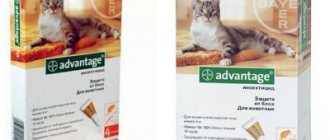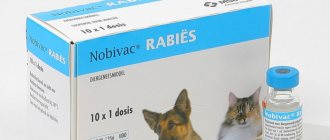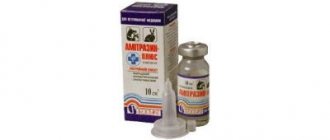Compound
Rimadyl R is a non-steroidal anti-inflammatory drug in the form of tablets for oral use containing carprofen as an active ingredient - 20 mg, 50 mg or 100 mg per tablet, and as excipients spray-dried pork liver powder, hydrolyzed vegetable protein, corn starch, confectionery sugar, glucose syrup, gelatin type A, magnesium stearate, and lactose monohydrate.
Properties
Carprofen, the active ingredient of Rimadyl R, belongs to the group of non-steroidal anti-inflammatory drugs, and has anti-inflammatory, analgesic and antipyretic effects. Carprofen, like other non-steroidal anti-inflammatory drugs, inhibits cycloxygenase in the arachidonic acid cycle. In this case, the drug predominantly affects cycloxygenase-II, which is induced in response to the development of inflammation. As a result, the synthesis of inflammatory prostaglandins, which cause inflammation, swelling and pain, is blocked. In therapeutic doses, carprofen has a significantly weaker effect on cycloxygenase-I, and therefore does not affect the synthesis of protective prostaglandins. Thus, carprofen does not interfere with normal physiological processes in tissues, especially in the stomach, intestines, kidneys and platelets. Carprofen is rapidly absorbed from the gastrointestinal tract, reaching peak plasma concentrations 1-3 hours after administration, with a bioavailability of more than 90%. The half-life in dogs is approximately 8 hours. Carprofen is more than 99% bound to plasma proteins. The drug is metabolized in the liver, excreted mainly in feces (about 80%), and in urine.
Dosage and method of administration
Rimadyl liver-flavored tablets are prescribed for inflammatory and pain phenomena arising from acute and chronic diseases of the musculoskeletal system. Rimadyl tablets are also used for analgesia and as an anti-inflammatory agent to reduce postoperative pain and swelling. Rimadyl liver-flavored tablets are used orally during the initial period of treatment at a daily dose of 4 mg of carprofen per 1 kg of body weight. It is recommended to divide the daily dose into two equal parts. After 7 days of treatment, depending on clinical indications, the daily dose can be reduced to 2 mg/kg body weight. For diseases of the musculoskeletal system, the duration of treatment depends on the condition of the animal and, under the supervision of a veterinarian, can continue throughout the life of the animal.
Composition and release form Rimadyl P 100 mg (tablets)
Rimadyl R liver-flavored tablets are light brown tablets with the letter “R” embossed on one side of the tablet and a dividing groove on the other side, containing 20, 50 or 100 mg of carprofen as the active ingredient and auxiliary components: spray-dried pork liver powder, hydrolyzed vegetable protein, corn starch, confectioners' sugar, glucose syrup, gelatin (type A), magnesium stearate and lactose monohydrate. Packaged in plastic jars of 20, 30, 50, 60, 100 and 180 tablets.
Side effects
Carprofen and auxiliary additives from Rimadyl do not cause pathological changes and do not disrupt vital processes in the body. However, like other drugs, this drug has contraindications for use.
It is prohibited to use in the treatment of cats with pathologies of the liver, kidneys, heart and other systems. Do not take if the body is highly sensitive to the active substance or other components, or if there is low blood supply.
Among the side effects that occur while taking Rimadyl are the following reactions of the body:
- Allergies and skin rashes.
- Mobility problems.
- Aggression and lack of coordination.
- The appearance of red spots on the skin.
- Vomiting reflex.
- Irritation of mucous membranes.
- Appetite disorders.
In addition, the pet may refuse liquids or begin to consume them in excessive quantities.
Veterinarians do not recommend using Rimadyl together with anti-inflammatory non-steroidal medications or nephrotoxic compounds.
Pharmacological properties
Rimadyl R , belonging to the group of non-steroidal anti-inflammatory drugs, has anti-inflammatory, analgesic and antipyretic effects. Carprofen, the active ingredient of Rimadyl R, in the arachidonic acid cycle primarily inhibits cycloxygenase-II, which is produced in the body in response to the development of inflammation. As a result, the synthesis of inflammatory prostaglandins, which cause inflammation, swelling and pain, is blocked. In therapeutic doses, carprofen has a much weaker effect on cycloxygenase-I, and therefore does not affect the synthesis of protective prostaglandins. Carprofen does not interfere with normal physiological processes in tissues, especially in the stomach, intestines, kidneys and platelets, is quickly absorbed from the gastrointestinal tract, reaches peak concentrations in the blood plasma 1 to 3 hours after administration, with a bioavailability of more than 90%. The half-life in dogs is approximately 8 hours. Carprofen is more than 99% bound to plasma proteins. The drug is metabolized in the liver, excreted in feces (about 80%), as well as in urine.
Analogues and prices
The cost of a bottle with 20 tablets of Rimadyl R 20 mg is 650-700 rubles. To purchase a package of 20 tablets R 100 you need to pay 800 rubles. The drug is sold in all veterinary pharmacies and zoological stores and is dispensed without a special prescription.
Various analogues of Rimadyl are common in veterinary practice. They have similar antipyretic and analgesic properties, but differ in composition. Among the most effective drugs are:
- Piroxicam.
- Previcox.
- Trokoksil.
An equally popular analogue is the Acti Vet complex, which contains plant extracts and has virtually no contraindications.
Rimadyl belongs to the category of the most common non-steroidal drugs that effectively fight various diseases in pets. The drug is widely used to combat local inflammatory pathologies in representatives of the cat family.
Doses and method of administration
Rimadyl liver-flavored tablets are used only internally. At the beginning of treatment, the daily dose is 4 mg of carprofen per 1 kg of body weight (for example, 1 Rimadyl R tablet containing 20 mg of carprofen per 5 kg of animal weight, 1 Rimadyl R tablet containing 100 mg of carprofen per 12.5 kg of animal weight or 1 tablet of Rimadyl R, containing 100 mg of carprofen, per 25 kg of animal weight). It is recommended to distribute the daily dose into two equal parts. After 7 days of treatment, depending on clinical indications, the daily dose can be reduced to 2 mg/kg body weight per day (1 tablet of 20 mg per 10 kg, 1 tablet of 100 mg per 25 kg or 1 tablet of 100 mg per 50 kg of animal weight) to 1. Introduction. The duration of therapy depends on the condition of the animal, but after 14 days of treatment the animal should be examined again by a veterinarian.
Reviews from owners and veterinarians
Maxim, a specialist from a veterinary clinic: “In veterinary practice, Rimadyl is considered a relatively new drug. According to the mechanism of action, it resembles Analgin, but due to the presence of carprofen in the composition, the spectrum of action of the drug is much wider.”
Oksana, cat owner: “My favorite is 5 years old. After her last pregnancy, her condition deteriorated greatly, to the point of completely refusing to eat. At an appointment with a veterinarian, he was advised to undergo a course of treatment with Rimadyl. The result was pleasantly surprising. The pet returned to normal vitality in a short time, and no side effects appeared.”
special instructions
Do not exceed the prescribed dose or duration of treatment. When using carprofen and warfarin simultaneously, the clinical situation must be carefully monitored, since both of these drugs bind to plasma proteins. During the procedure with Rimadyl R, you should follow the general rules of personal hygiene and safety precautions provided for when working with medicines. As with any medicine, wash your hands thoroughly with warm water and soap after handling. It is prohibited to consume food or water while working.
Storage conditions
With caution (list B) in a dry, dark place, out of reach of children, at a temperature of 0 to 25 ° C. Shelf life – 3 years.
Appointments
For animals, the drug is prescribed for osteoarthritis, a disease that causes severe pain and affects both old and young dogs. Carprofen is often prescribed after operations to reduce inflammation, for pain, for swelling in dogs, and is also often used for problems associated with the musculoskeletal system. A special advantage of the tablets is the possibility of their long-term use. The analgesic effect of Carprofen is especially valuable for the animal, which helps relieve pain after surgery and during exacerbations of chronic diseases.
The analgesic effect of the tablets allows you to avoid pain during exacerbation of chronic diseases, as well as in case of injuries to bone tissue in an animal. Finding a non-steroidal drug that would simultaneously relieve external signs of the disease and pain is not so easy. Many pet owners try several types of medications to see which is best tolerated. Of the group of anti-inflammatory drugs, Carprofen can be called the most easily tolerated. In addition, the convenient release form allows you to select the dose of the medicine that is ideal for the animal’s body weight and indications.
Carprofen has several effects on the dog:
- reduces temperature;
- removes swelling;
- reduces pain.
The medicine affects the dog’s nervous system, but does not inhibit other body functions, does not reduce appetite, and does not contribute to changes in the dog’s body weight.
Limitations and possible consequences
Rimadyl is considered a safe drug for dogs, but has restrictions on its use. The medicine is not prescribed:
- for chronic diseases of the heart, liver, kidneys;
- in case of circulatory disorders;
- in case of dysfunction of the digestive system, including gastritis;
- during pregnancy, lactation;
- at an early age (up to one year);
- in case of individual intolerance to the components.
The veterinarian should be informed about the presence of these pathologies or the use of any medications during examination. Rimadyl is not prescribed if animals are predisposed to allergic reactions or if they are planning mating in the near future.
Important! The medicine should not be given with other anti-inflammatory or nephrotoxic drugs.
If the dosage is violated, self-medication and there are prohibitions on taking carprofen, negative reactions are possible:
- lack of appetite, complete refusal to eat;
- nausea, vomiting;
- increased thirst;
- diarrhea with bloody discharge;
- yellowing of the skin, sclera of the eyes;
- frequent urination;
- skin reactions - redness, ulceration;
- change in behavior: aggression, tremors, lack of coordination of movements.
Price
The price of Rimadyl varies depending on the dosage form. A bottle of solution with a capacity of 20 ml costs 2000-2200 rubles. Since cats are usually given one or maximum two injections, buying a container of medicine is in most cases impractical, and smaller bottles are not sold. In addition, it cannot be stored for a long time afterwards. Many veterinary clinics only allow you to pay for one injection. In this case, you won’t have to overpay.
A package of 20 tablets (20 mg each) will cost 480-580 rubles. There is no point in buying other types of tablets for cats, since it will be impossible to calculate the exact dose.
You can now view the current price of the drug and buy it right here from Yandex Market with fast delivery:
How it works
There is only one active ingredient in tablets and solution – carprofen. Therefore, the main effect of both drugs is the same: the synthesis of inflammatory prostaglandins is blocked. As a result:
- pain is relieved;
- inflammation is eliminated;
- fever decreases slightly.
L-Arginine contained in the solution further strengthens the immune system, accelerates wound healing, promotes muscle gain and fat loss. It also stimulates collagen production, improves blood circulation, including normalizing blood flow to the joints.
Answers to frequently asked questions
Is Rimadyl sold without a prescription?
No, the drug is dispensed only as prescribed by a veterinarian and used under his supervision. The drugs have strong side effects, so a specialist must calculate the dosage, determine the duration of the course and monitor the animal’s condition.
Is it permissible to give medication continuously?
In special cases, it is possible to use tablets in courses (every few months) or for life in older dogs. But such use is undesirable due to negative reactions from the gastrointestinal tract.
Can I give Rimadyl injections myself?
Possibly if you know how to inject. But usually there is no need: injections are given 1, maximum 2 times in special cases: after fractures, operations, etc. In addition, when used independently, there is a risk of incorrectly calculating the dosage.
How quickly do the pills work?
The first effects are noticeable after an hour. Maximum pain relief is achieved within 3 hours.
Different breeds
Depending on what breed the pet is: large, medium or small, you need to calculate the exact dosage of the drug.
Insufficient intake of the active substance into the body will be ineffective in treating the disease, while an overdose can be fatal, especially for small breeds. Therefore, it is better to discuss this issue with a specialist.
How safe is it?
Rimadyl is generally safer for dogs than other NSAIDs, but it is possible that an animal will react to the drug and cause a life-threatening condition.
The drug may have a negative effect on animals with the following clinical indications:
- liver or kidney failure,
- advanced age of the animal (higher risk of negative reactions),
- bleeding (for example, von Willebrand disease - a hereditary disease associated with blood clotting disorders),
- intestinal inflammation,
- animal age - up to 6 weeks,
- during pregnancy or breastfeeding.
Indications for use
Rimadyl tablets and injections are indicated:
- in the postoperative period, to eliminate inflammatory processes and swelling in the body after surgery;
- for the treatment of acute and chronic forms of diseases of the musculoskeletal system, mainly with degenerative changes in the area of joints and cartilage (osteoarthritis).
Common diseases of cats are aspergillosis, lichen, helminthiasis, ear mites, demodicosis, urolithiasis, epiphora, calcivirosis.
Rimadyl R 50 mg (liver flavor) 20 tablets.
COMPOSITION AND FORM OF RELEASE
Rimadyl R tablets with liver flavor are light brown tablets with an embossed letter “R” on one side of the tablet and a dividing groove on the other side, containing 50 mg of carprofen as an active ingredient and formative components. Packaged in plastic jars of 20 tablets.
PHARMACOLOGICAL PROPERTIES
Rimadyl R, which belongs to the group of non-steroidal anti-inflammatory drugs, has anti-inflammatory, analgesic and antipyretic effects. Carprofen, the active ingredient of Rimadyl R, in the arachidonic acid cycle primarily inhibits cycloxygenase-II, which is produced in the body in response to the development of inflammation. As a result, the synthesis of inflammatory prostaglandins, which cause inflammation, swelling and pain, is blocked. In therapeutic doses, carprofen has a much weaker effect on cycloxygenase-I, and therefore does not affect the synthesis of protective prostaglandins. Carprofen does not interfere with normal physiological processes in tissues, especially in the stomach, intestines, kidneys and platelets, is quickly absorbed from the gastrointestinal tract, reaches peak concentration in blood plasma 1 to 3 hours after administration, with a bioavailability of more than 90%. The half-life in dogs is approximately 8 hours. Carprofen is more than 99% bound to plasma proteins. The drug is metabolized in the liver, excreted in feces (about 80%), as well as in urine.
INDICATIONS
Prescribed to dogs to relieve inflammation and pain in acute and chronic diseases of the musculoskeletal system (osteoarthritis), for analgesia and as an anti-inflammatory agent to reduce postoperative pain and swelling.
DOSES AND METHOD OF APPLICATION
Rimadyl R tablets are used only internally. At the beginning of treatment, the daily dose is 4 mg of carprofen per 1 kg of body weight (1 tablet of Rimadyl R, containing 50 mg of carprofen, per 12.5 kg of animal weight). It is recommended to distribute the daily dose into two equal parts. After 7 days of treatment, depending on clinical indications, the daily dose can be reduced to 2 mg/kg body weight per day (1 50 mg tablet per 25 kg of animal weight) per 1 administration. The duration of therapy depends on the condition of the animal, but after 14 days of treatment the animal should be examined again by a veterinarian.
SIDE EFFECTS
In rare cases, irritation of the gastric mucosa and vomiting may occur.
CONTRAINDICATIONS
Hypersensitivity to carprofen. Do not use on puppy dogs. The drug should be administered with caution to animals with heart, kidney and liver diseases. It is not recommended to prescribe other non-steroidal anti-inflammatory drugs or nephrotoxic drugs earlier than 24 hours after administration of Rimadyl R.
SPECIAL INSTRUCTIONS
Do not exceed the prescribed dose or duration of treatment. When using carprofen and warfarin simultaneously, the clinical situation must be carefully monitored, since both of these drugs bind to plasma proteins. During the procedure with Rimadyl R, you should follow the general rules of personal hygiene and safety precautions provided for when working with medicines. As with any medicine, wash your hands thoroughly with warm water and soap after handling. It is prohibited to consume food or water while working.
Pregnant, lactating and puppies
Most veterinarians do not recommend giving this drug to female dogs at any stage of pregnancy as it may adversely affect the fetus. It is also contraindicated for nursing mothers.
The question of whether this medicine can be given to puppies should be decided by a specialist. If its use is justified, the doctor must calculate the exact dosage depending on the degree of development and condition of the animal. He will also tell you how best to treat the puppies - give injections or feed tablets.
Contraindications and precautions
This non-steroidal drug has its contraindications: Cat pregnancy. Heart diseases. Pathologies of the kidneys and liver. Severe blood loss (during surgery or injury). Intolerance to Carprofen.
Side effects include: Impaired coordination. Allergy. Aggression. Impaired mobility. Anxiety. Change in skin color. Insomnia. The presence of bloody inclusions in stool and urine. Yellowing of the skin and mucous membranes of the eyes. Inflammation of the gastric mucosa. Frequent vomiting. Decreased or increased appetite. Thirst or refusal of water.
Attention. It is not recommended to use Rimadyl together with other non-steroidal drugs and nephrotoxic drugs. If therapy does not exclude such a combination, the animal requires strict veterinary control.
In addition to observing the dosage and rules for taking the drug, the owner of the animal should think about his own safety. When working with this medication, it is forbidden to smoke, drink and eat foods. Injections or use of the tablet form of the drug should be carried out away from food and children's things. The skin of your hands should be protected with rubber gloves, and after the procedure, wash with soap. The container in which the suspension was prepared must be disposed of. If the product gets on the mucous membranes of the eyes, you should immediately rinse them with water. In case of accidental ingestion of the drug, it is recommended to take absorbent agents in an appropriate dose. In general, there are only positive reviews about Rimadyl for cats. A guarantee of the absence of complications after therapy is strict adherence to the rules for taking the drug.
Active substance and mechanism of action
According to the official instructions for use, “Rimadyl” for cats consists of two groups of substances: the main active substance and auxiliary ones.
Regardless of the form of the drug, its main active ingredient is carprofen . In liquid form, the product is a 5% aqueous solution; in tablet form, the amount of dry carprofen can range from 20 to 100 mg per tablet.
Did you know? Pharmaceuticals owe this form of medicines as tablets to the American physician William Upjohn. In 1880, a doctor first invented a method for pressing powders. By 1886, the inventor created a special machine for the production of tablets, which made a real revolution in the production of medicines.
Additional substances in liquid form include 1% benzyl alcohol, which plays the role of a preservative.
In tablet form, the amount of excipients is quite large. First of all, these are: pork liver powder (as a flavoring), vegetable proteins in hydrolyzed form, corn starch, sugar, glucose syrup, gelatin, magnesium stearate, lactose monohydrate.
After entering the animal’s body, the drug is instantly metabolized, and its active effect on organs and systems is achieved after just a few hours. Once in the animal's body, carprofen affects the appearance of a specific hormonal level, which is produced in response to the damaging effects of negative factors.
As a result, the synthesis in the body of substances from the group of prostaglandins, which cause inflammation and pain, is inhibited. The medication is removed from the body as quickly as it is metabolized. Its half-life in cats is approximately 19 hours. Metabolic products are excreted mainly in feces (up to 80%).
Did you know? Physiological substances such as prostaglandins were discovered thanks to Ulf von Euler, who identified them by studying the composition of seminal fluid. It was this feature that influenced the emergence of the term, since it got its name from the Latin “glandula prostatica”, which means “prostate gland”.











